全国高校网络教育大学英语统考(B)试题及答案(1)
- 格式:doc
- 大小:130.00 KB
- 文档页数:34
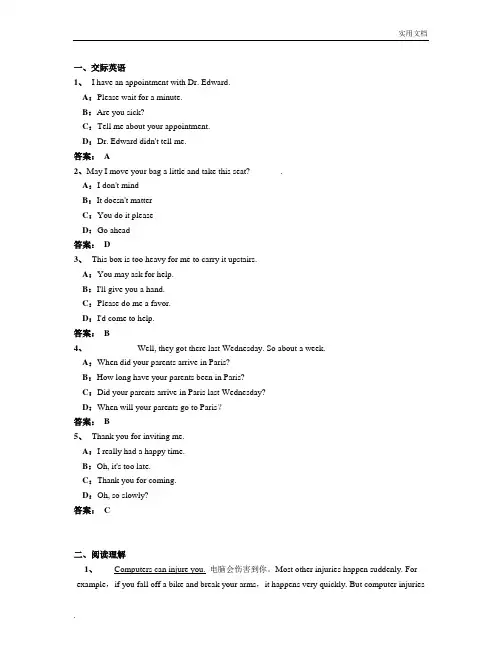
一、交际英语1、- I have an appointment with Dr. Edward.- ________A:Please wait for a minute.B:Are you sick?C:Tell me about your appointment.D:Dr. Edward didn't tell me.答案:A2、May I move your bag a little and take this seat?_______.A:I don't mindB:It doesn't matterC:You do it pleaseD:Go ahead答案:D3、- This box is too heavy for me to carry it upstairs.- _______A:You may ask for help.B:I'll give you a hand.C:Please do me a favor.D:I'd come to help.答案:B4、- - Well, they got there last Wednesday. So about a week.A:When did your parents arrive in Paris?B:How long have your parents been in Paris?C:Did your parents arrive in Paris last Wednesday?D:When will your parents go to Paris?答案:B5、- Thank you for inviting me.- _______A:I really had a happy time.B:Oh, it's too late.C:Thank you for coming.D:Oh, so slowly?答案: C二、阅读理解1、Computers can injure you.电脑会伤害到你。
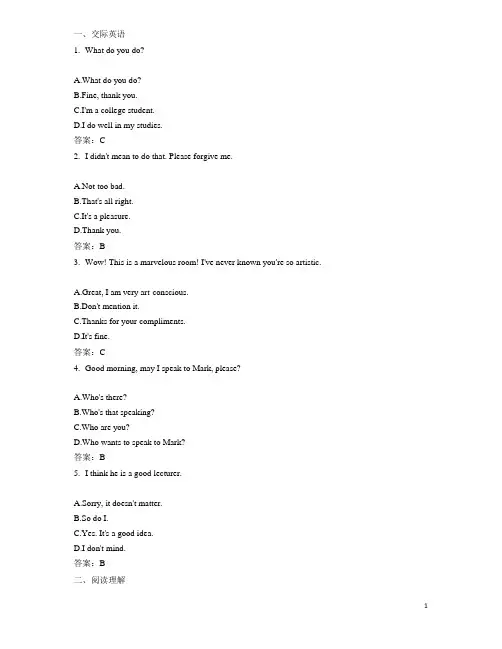
一、交际英语1.- What do you do?- _________A.What do you do?B.Fine, thank you.C.I'm a college student.D.I do well in my studies.答案:C2.- I didn't mean to do that. Please forgive me.- _________A.Not too bad.B.That's all right.C.It's a pleasure.D.Thank you.答案:B3.- Wow! This is a marvelous room! I've never known you're so artistic. - ______A.Great, I am very art-conscious.B.Don't mention it.C.Thanks for your compliments.D.It's fine.答案:C4.- Good morning, may I speak to Mark, please?- _________A.Who's there?B.Who's that speaking?C.Who are you?D.Who wants to speak to Mark?答案:B5.- I think he is a good lecturer.- _________A.Sorry, it doesn't matter.B.So do I.C.Yes. It's a good idea.D.I don't mind.答案:B二、阅读理解Chinese New Year, which is also called the Spring Festival, is the most important festival in China. The holiday begins on the first day of the new cycle(循环)of the moon, which occurs in late January or early February. The celebration will last 2 weeks.远程教育、网络教育大学英语B、计算机应用基础统考辅导整套题库,精心整理归类,全中文翻译,视频教程讲解,零基础一次通过,索取请加QQ:153499368In the week before the New Year, families clean their houses in order to sweep away all the bad lucks.On the evening before the New Year, families gather for a big feast. They prepare all kinds of dishes and dumplings(饺子). At midnight, they set off fireworks(焰火).On the first day of the New Year, people put on new clothes and then they take gifts to friends and relatives. The adults(成人)usually give new year bonus(压岁钱)to their children.During the Spring Festival, the most special activity is the dragon and lion dances. As many as 50 or more people support special dragons and lions which are made of cloth, while dancing down the street.The celebrations end with the Lantern Festival(元宵节)on the 15th day of the 1st month of the lunar year.6.The most important festival in China is the Spring Festival.A.TB.F答案:A7.The celebration of the Spring Festival will last 2 weeks.A.TB.F答案:A8.In order to get away the bad lucks in the old days, in the week before the Spring Festival, people light fireworks.A.TB.F答案:B9.On the first day of the Spring Festival, the children are given some money.A.TB.F答案:A10.The dragons and lions which people use in the dances are made of metal.A.TB.FWhat makes a person a scientist? Does he have ways or tools of learning that are different from those of others? The answer is “no”. It is not the tools a scientist uses but how he uses these tools that makes him a scientist. You will probably agree that knowing how to use a power is important to a carpenter. You will probably agree, too, that knowing how to investigate, how to discover information, is important to everyone. The scientist, however, goes one step further, he must be sure that he has a reasonable answer to his questions and that his answer can be confirmed by other persons. He also works to fit the answers he gets to many questions into a large set of ideas about how the world works. 远程教育、网络教育大学英语B、计算机应用基础,整套题库,整理归类完毕,全中文翻译,视频教程讲解,索取请加Q Q: 153499368The scientist’s k nowledge must be exact. There is no room for half right or right just half the time. He must be as nearly right as the conditions permit. What works under one set of conditions at one time must work under the same conditions at other times. If the conditions are different, any changes the scientist observes in a demonstration must be explained by the changes in the conditions. This is one reason that investigations are important in science. Albert Einstein, who developed the Theory of Relativity, arrived at this theory through mathematics. The accuracy of his mathematics was later tested through investigations, and Einstein’s ideas were shown to be correct. A scientist uses many tools for measurements. Then the measurements are used to make mathematical calculations that may test his investigations.11.What makes a scientist according to the passage? ________A.The tools he uses.B.The way he uses his tools.C.His ways of learning.D.The various tools he uses.答案:B12.The underlined part in the passage shows_______.A.the importance of informationB.the importance of thinkingC.the difference between scientists and ordinary peopleD.the difference between carpenters and people with other jobs答案:C13.A sound scientific theory should be one that _________.A.works not only under one set of conditions at one time, but also under the same conditions at other timesB.does not allow any changes even under different conditionsC.can be used for many purposesD.leaves no room for improvement14.The author quotes the case of Albert Einstein to illustrate __________.A.that measurements are keys to success in scienceB.that accuracy of mathematicsC.that investigations are important in scienceD.that the mathematical calculations may test his investigations答案:C15.What is the main idea of the passage? ________A.The theory of relativity.B.Exactness is the core of science.C.Scientists are different from ordinary people.D.Exactness and ways of using tools are the keys to the making of a scientist.答案:D三、词汇与语法16.We've missed the last bus. I'm afraid we have no ________ but to take a taxi.A.wayB.choiceC.possibilityD.selection答案:B17.So little ________ about chemistry that the lecture was completely beyond me.A.did I knowB.I had knownC.did I knewD.I know答案:A18.The reason I did not go abroad was _____ a job in my home town.A.becauseB.due toC.that I gotD.because of getting答案:C19.He _______ driving me home, even though I told him I lived nearby.A.insisted onB.insisted atC.insisted thatD.insisted in20.Twenty people were ________ wounded in the air crash.A.quicklyB.wronglyC.bitterlyD.seriously答案:D四、完型填空What is a museum? A museum is a good place to keep __21__ and beautiful things. A museum may be a place to learn about science. A museum can be a place __22__ art of Indians or animals. What is inside a museum? Some museums have old cars and airplanes.__23__ museums have pictures and statues (雕像). Others have rocks and old bones. One museum even has a coal mine inside! Many cities have museums. Some very smalltowns have museums,__24__. Indianapolis has achildren'smuseum. Children do not have to pay to get in. Children go to the museum often. They like to look at the dinosaur bones. They see a white bear ten feet tall. They go inside an old log cabin (小木屋). On Saturday, Indianapolis children can__25__ talks about animals and trees. They see movies.21.A.aboutB.hearC.oldD.tooE.Many答案:C22.A.aboutB.hearC.oldD.tooE.Many答案:A23.A.aboutB.hearC.oldD.tooE.Many答案:E24.A.aboutB.hearC.oldD.tooE.Many答案:D25.A.aboutB.hearC.oldD.tooE.Many答案:B五、英译汉26.It's still raining today!答案:今天还在下雨。
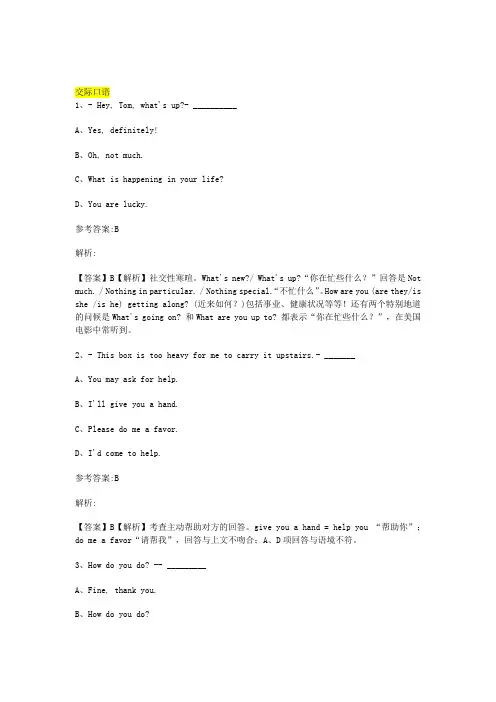
交际口语1、- Hey, Tom, what's up?- __________A、Yes, definitely!B、Oh, not much.C、What is happening in your life?D、You are lucky.参考答案:B解析:【答案】B【解析】社交性寒暄。
What's new?/ What's up?“你在忙些什么?”回答是Not much. / Nothing in particular. / Nothing special.“不忙什么”。
How are you (are they/is she /is he) getting along? (近来如何?)包括事业、健康状况等等!还有两个特别地道的问候是What's going on? 和What are you up to? 都表示“你在忙些什么?”,在美国电影中常听到。
2、- This box is too heavy for me to carry it upstairs.- _______A、You may ask for help.B、I'll give you a hand.C、Please do me a favor.D、I'd come to help.参考答案:B解析:【答案】B【解析】考查主动帮助对方的回答。
give you a hand = help you “帮助你”;do me a favor“请帮我”,回答与上文不吻合;A、D项回答与语境不符。
3、How do you do? -- _________A、Fine, thank you.B、How do you do?C、Not too bad.D、Very well.参考答案:B解析:【答案】B【解析】固定用法,初次见面问候,打招呼的常用语。
4、- How are you, Bob? -________A、How are you?B、I'm fine. Thank you.C、How do you do?D、Nice to meet you.参考答案:B解析:【答案】B【解析】日常问候语的回答。
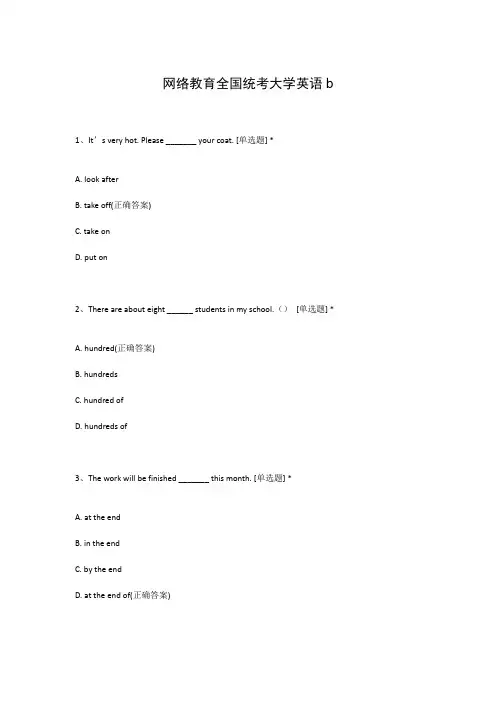
网络教育全国统考大学英语b1、It’s very hot. Please _______ your coat. [单选题] *A. look afterB. take off(正确答案)C. take onD. put on2、There are about eight ______ students in my school.()[单选题] *A. hundred(正确答案)B. hundredsC. hundred ofD. hundreds of3、The work will be finished _______ this month. [单选题] *A. at the endB. in the endC. by the endD. at the end of(正确答案)4、--It is Sunday tomorrow, I have no idea what to do.--What about _______? [单选题] *A. play computer gamesB. go fishingC. climbing the mountain(正确答案)D. see a film5、Allen is looking forward to _______ his American partner at the trade fair. [单选题] *A. meetB. meeting(正确答案)C. be meetingD. having meeting6、( ) What other books have you read___ this English novel? [单选题] *A. besides(正确答案)B. exceptC.inD. about7、56.Sam is in a hurry. Maybe he has got ________ important to do. [单选题] * A.everythingB.nothingC.anythingD.something(正确答案)8、14.He is cutting the apple ________ a knife. [单选题] *A.inB.toC.with(正确答案)D.by9、The early Americans wanted the King to respect their rights. [单选题] *A. 统治B. 满足C. 尊重(正确答案)D. 知道10、As soon as he _______, he _______ to his family. [单选题] *A. arrived, writesB. arrived, writtenC. arrived, wrote(正确答案)D. arrives, write11、39.—What do you ________ my new dress?—Very beautiful. [单选题] * A.look atB.think aboutC.think of(正确答案)D.look through12、You should stick to your()and tell him you won' t do the thing. [单选题] *A. principle(正确答案)B. qualityC. contactD. influence13、The plane arrived at London airport _______ Wednesday morning. [单选题] *A. on(正确答案)B. atC. inD. for14、49.________ is the price of the product? [单选题] *A.HowB.How muchC.What(正确答案)D.How many15、My brother is _______ actor. He works very hard. [单选题] *A. aB. an(正确答案)C. theD. one16、Nearly everything they study at school has some practical use in their life, but is that the only reason _____ they go to school? [单选题] *A. why(正确答案)B. whichC. becauseD. what17、No writer will be considered()of the name until he writes a work. [单选题] *A. worthlessB. worthy(正确答案)C. worthwhileD. worth18、It was()of you to get up early to catch the first bus so that you could avoid the traffic jam. [单选题] *A. senselessB. sensible(正确答案)C. sentimentalD. sensitive19、I’d like to know the _______ of the club. [单选题] *A. schedule(正确答案)B. schoolC. menuD. subject20、I couldn’t find Peter,_____did I know where he had gone. [单选题] *A.nor(正确答案)B.eitherC.neverD.as21、-----How can I apply for an online course?------Just fill out this form and we _____ what we can do for you. [单选题] *A. seeB. are seeingC. have seenD. will see(正确答案)22、Miss Smith is a friend of _____. [单选题] *A. Jack’s sister’s(正确答案)B. Jack’s sisterC. Jack sister’sD. Jack sister23、Many volunteers _______ food and water to the local people in Japan after tsunami(海啸). [单选题] *A. gave out(正确答案)B. cut outC. put outD. found out24、I usually do some ____ on Sundays. [单选题] *A. cleaningsB. cleaning(正确答案)C. cleansD. clean25、The soldiers would rather die than give in. [单选题] *A. 呈交B. 放弃C. 泄露D. 投降(正确答案)26、There was a time()I wondered why I would like to do this boring job. [单选题] *A. whichB. whyC. whereD. when(正确答案)27、There are trees on both sides of the broad street. [单选题] *A. 干净的B. 狭窄的C. 宽阔的(正确答案)D. 宁静的28、The black coal there shows a sharp()white snow. [单选题] *A. contract withB. content withC. contact toD. contrast to(正确答案)29、I’d like to go with you, ______ I’m too busy. [单选题] *A. orB. andC. soD. but(正确答案)30、You can distinguish the twins very easily, _____Tom is quite while Jack is active. [单选题] *A. soB. butC. for(正确答案)D. and。
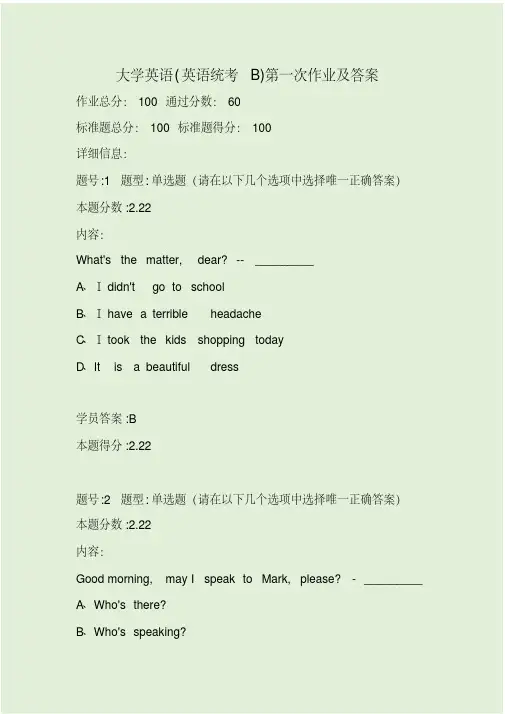
大学英语(英语统考B)第一次作业及答案作业总分:100通过分数:60标准题总分:100标准题得分:100详细信息:题号:1题型:单选题(请在以下几个选项中选择唯一正确答案)本题分数:2.22内容:What's the matter,dear?--_________A、Ididn't go to schoolB、Ihave a terrible headacheC、Itook the kids shopping todayD、It is a beautiful dress学员答案:B本题得分:2.22题号:2题型:单选题(请在以下几个选项中选择唯一正确答案)本题分数:2.22内容:Good morning,may I speak to Mark,please?-_________A、Who's there?B、Who's speaking?C、Who are you?D、Who wants to speak to Mark?学员答案:B本题得分:2.22题号:3题型:单选题(请在以下几个选项中选择唯一正确答案)本题分数:2.22内容:Let me introduce myself.I'm Steward.-_________A、What a pleasureB、Pleased to meet youC、Idon't knowD、Thanks a lot学员答案:B本题得分:2.22题号:4题型:单选题(请在以下几个选项中选择唯一正确答案)本题分数:2.22内容:Let's go to the library this afternoon.-_________A、Yes,that's rightB、No.I can'tC、What about you?D、That's a good idea学员答案:D本题得分:2.22题号:5题型:单选题(请在以下几个选项中选择唯一正确答案)本题分数:2.22内容:What does Tom's wife do for a living?-_________.A、She is a doctorB、Tom loves his wifeC、She has a happy lifeD、She lives far from here学员答案:A本题得分:2.22题号:6题型:单选题(请在以下几个选项中选择唯一正确答案)本题分数:2.22内容:I’msorry to trouble you.--_________.A、The same to youB、What a pity!I’msorry to hear thatC、It doesn’tmatterD、hanks a lot学员答案:C本题得分:2.22题号:7题型:单选题(请在以下几个选项中选择唯一正确答案)本题分数:2.22内容:Unbelievable!I have failed the driving test again! _________.This is not the end of the world.A、Good luckB、Cheer upC、Go aheadD、No problem学员答案:B本题得分:2.22题号:8题型:单选题(请在以下几个选项中选择唯一正确答案)本题分数:2.22内容:Could you help me with my physics,please?_________.A、No,no wayB、No,I couldn’tC、No,I can’tD、Sorry I can’t.I have to go to a meeting right now学员答案:D本题得分:2.22题号:9题型:单选题(请在以下几个选项中选择唯一正确答案)本题分数:2.22内容:Can I have a look at your letter,please?_________.A、Excuse me,you can’tB、I’mafraid you can’tC、Ican’tagree with youD、Yes,thank you学员答案:B本题得分:2.22题号:10题型:单选题(请在以下几个选项中选择唯一正确答案)本题分数:2.22内容:Susan is absent from today’swriting class._________? As far as I know,she has never missed a class.A、How comeB、So whatC、WhyD、What for学员答案:A本题得分:2.22题号:11题型:单选题(请在以下几个选项中选择唯一正确答案)本题分数:2.22内容:I think he is a good lecturer._________A、Sorry,it doesn’tmatterB、So do I.C、Yes.It’sa good idea.D、Idon’tmind学员答案:B本题得分:2.22题号:12题型:单选题(请在以下几个选项中选择唯一正确答案)本题分数:2.22内容:What do you think of the song?_________.A、It sounds sweetB、Ilike music very muchC、Idon’tknow the titleD、It was a pleasure学员答案:A本题得分:2.22题号:13题型:单选题(请在以下几个选项中选择唯一正确答案)本题分数:2.22内容:Let’sgo to a movie after work,OK?--__________.A、Not at allB、Why not?C、Never mindD、Who is it?学员答案:B本题得分:2.22题号:14题型:单选题(请在以下几个选项中选择唯一正确答案)本题分数:2.22内容:Why not join us in the game?--__________.A、OK!I’mcomingB、No,you do the sameC、Oh,that’sall rightD、Don’tmention it学员答案:A本题得分:2.22题号:15题型:单选题(请在以下几个选项中选择唯一正确答案)内容:Excuse me,could you tell methe way to the British Museum? --Sorry,I’ma stranger here.--___________.A、Thanks,anywayB、It doesn’tmatterC、Never mindD、No problem学员答案:A本题得分:2.22题号:16题型:单选题(请在以下几个选项中选择唯一正确答案)本题分数:2.22内容:I’msorry.I lost the key.--__________.A、Well,it’sOKB、No,it’sall rightC、You are welcomeD、You are wrong学员答案:A题号:17题型:单选题(请在以下几个选项中选择唯一正确答案)本题分数:2.22内容:Doyou dance?--Yes,I do.--___________?--Every weekend.A、how hard do you practiceB、how much do you pay for itC、how often do you go dancingD、how long do you practice it学员答案:C本题得分:2.22题号:18题型:单选题(请在以下几个选项中选择唯一正确答案)本题分数:2.22内容:________?--He is not very well.A、Who is heB、What is heC、How is heD、Who he is学员答案:C本题得分:2.22题号:19题型:单选题(请在以下几个选项中选择唯一正确答案)本题分数:2.22内容:Could I ask you a rather personal question?--Of course, _________.A、good ideaB、that’srightC、never mindD、go ahead学员答案:D本题得分:2.22题号:20题型:单选题(请在以下几个选项中选择唯一正确答案)本题分数:2.22内容:Oh,dear!I’ve just broken a window.--________.A、GreatB、Don’tworryC、That’sfineD、Not at all学员答案:C本题得分:2.22题号:21题型:单选题(请在以下几个选项中选择唯一正确答案)本题分数:2.22内容:WhenLily camehomeat5p.m.yesterday,her mother_______ dinner in the kitchen.A、cookedB、was cookingC、cooksD、has cooked学员答案:B本题得分:2.22题号:22题型:单选题(请在以下几个选项中选择唯一正确答案)内容:Did you notice the guy______head looked like a big potato?A、whoB、whichC、whoseD、whom学员答案:C本题得分:2.22题号:23题型:单选题(请在以下几个选项中选择唯一正确答案)本题分数:2.22内容:Both the kids and their parents______English,I think.I know it from their accent.A、isB、beenC、areD、was学员答案:C题号:24题型:单选题(请在以下几个选项中选择唯一正确答案)本题分数:2.22内容:Never before_______see such a terrible car accident on the road!A、IhaveB、have IC、IdidD、did I学员答案:D本题得分:2.22题号:25题型:单选题(请在以下几个选项中选择唯一正确答案)本题分数:2.22内容:John's father______mathematics in this school ever since he graduated from Harvard University.A、taughtB、teachesC、has taughtD、is teaching学员答案:C本题得分:2.22题号:26题型:单选题(请在以下几个选项中选择唯一正确答案)本题分数:2.22内容:Professor Johnson comes from either Oxford or MIT,I can’t remember_______.A、whereB、thereC、whichD、that学员答案:A本题得分:2.22题号:27题型:单选题(请在以下几个选项中选择唯一正确答案)本题分数:2.22内容:Important____his discovery was,it was regarded as a matter of no account in his time.A、whenB、untilC、asD、although学员答案:C本题得分:2.22题号:28题型:单选题(请在以下几个选项中选择唯一正确答案)本题分数:2.22内容:Don’tyou feel surprised to see George at the meeting?—Yes.I really didn’tthink he_______here.A、has beenB、had beenC、would beD、would have been学员答案:C本题得分:2.22题号:29题型:单选题(请在以下几个选项中选择唯一正确答案)本题分数:2.22内容:Whenwe write,we must write as_______as we can.A、carefulB、carefullyC、more carefulD、more carefully学员答案:B本题得分:2.22题号:30题型:单选题(请在以下几个选项中选择唯一正确答案)本题分数:2.22内容:__________there any good news in today’snewspaper?A、AreB、IsC、HaveD、Has学员答案:B本题得分:2.22题号:31题型:单选题(请在以下几个选项中选择唯一正确答案)本题分数:2.22内容:On formal________,people pay more attention to manners.A、situationsB、casesC、conditionsD、occasions学员答案:D本题得分:2.22题号:32题型:单选题(请在以下几个选项中选择唯一正确答案)本题分数:2.22内容:If you_______your work,you can go there first.A、will finishB、finishedC、finishingD、have finished学员答案:D本题得分:2.22题号:33题型:单选题(请在以下几个选项中选择唯一正确答案)本题分数:2.22内容:The soup smells________.Would you like some?A、goodB、wellC、properlyD、finely学员答案:A本题得分:2.22题号:34题型:单选题(请在以下几个选项中选择唯一正确答案)本题分数:2.22内容:How much did you________all these things?–More than forty dollars.A、spendB、costC、giveD、pay for学员答案:D本题得分:2.22题号:35题型:单选题(请在以下几个选项中选择唯一正确答案)本题分数:2.22内容:Nancy was badly injured in the accident yesterday and she was sent to hospital.–Oh,really?I________.I am going to visit her.A、hadn’tknowB、don’tknowC、didn’tknowD、haven’tknown学员答案:C本题得分:2.22题号:36题型:单选题(请在以下几个选项中选择唯一正确答案)本题分数:2.22内容:It’shigh time that he settled down in the country and ________a new life.A、startB、startedC、startingD、to start学员答案:B本题得分:2.22题号:37题型:单选题(请在以下几个选项中选择唯一正确答案)本题分数:2.22内容:John was busy,________he could not come.A、butB、thereforeC、andD、nor学员答案:B本题得分:2.22题号:38题型:单选题(请在以下几个选项中选择唯一正确答案)本题分数:2.22内容:They have done________work these days.A、too muchB、much tooC、too manyD、many too学员答案:A本题得分:2.22题号:39题型:单选题(请在以下几个选项中选择唯一正确答案)本题分数:2.22内容:________no need________the radio as I’ve used to studying with it on.A、It’s,to turn downB、It’s,turning upC、There’s,to turn offD、There’s,turning off学员答案:C本题得分:2.22题号:40题型:单选题(请在以下几个选项中选择唯一正确答案)本题分数:2.22内容:What we have done is far from________.A、satisfactoryB、satisfiedC、satisfactionD、satisfy学员答案:C本题得分:2.22题号:41题型:单选题(请在以下几个选项中选择唯一正确答案)本题分数:2.22内容:Don’tworry.There’sstill_______time to go.A、littleB、alittleC、fewD、afew学员答案:B本题得分:2.22题号:42题型:单选题(请在以下几个选项中选择唯一正确答案)本题分数:2.22内容:A man should not be judged always______what he says.A、byB、inC、withD、to学员答案:A本题得分:2.22题号:43题型:单选题(请在以下几个选项中选择唯一正确答案)内容:It was getting_________,he had to stop to have a rest.A、very darkerB、dark and darkC、darker and darkerD、darkest and darkest学员答案:C本题得分:2.22题号:44题型:单选题(请在以下几个选项中选择唯一正确答案)本题分数:2.22内容:If we could learn English in the same_______,it would not seem so difficult.A、roadB、wayC、theoryD、means学员答案:B题号:45题型:单选题(请在以下几个选项中选择唯一正确答案)本题分数:2.22内容:______his examination of the patient,the doctor wrote out a prescription.A、Having finishedB、FinishingC、FinishedD、Having been finished学员答案:A本题得分:2.22。
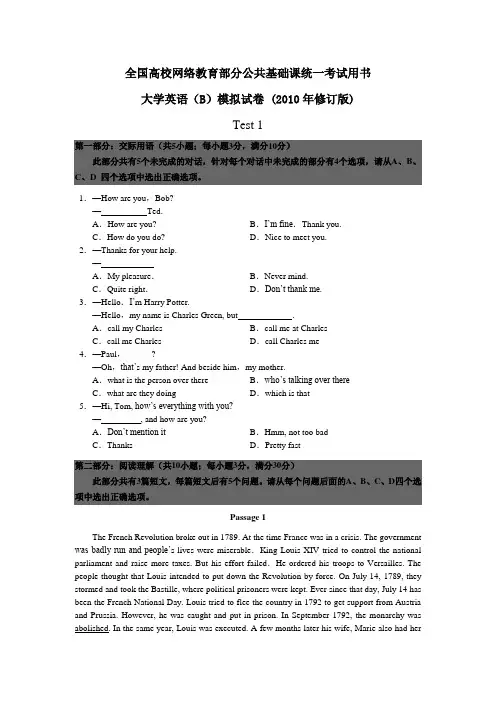
全国高校网络教育部分公共基础课统一考试用书大学英语(B)模拟试卷 (2010年修订版)Test 1第一部分:交际用语(共5小题;每小题3分,满分10分)此部分共有5个未完成的对话,针对每个对话中未完成的部分有4个选项,请从A、B、C、D 四个选项中选出正确选项。
1.—How are you,Bob?— __________Ted.A.How are you? B.I’m fine.Thank you.C.How do you do? D.Nice to meet you.2.—Thanks for your help.—A.My pleasure.B.Never mind.C.Quite right.D.Don’t thank me.3.—Hello.I’m Harry Potter.—Hello,my name is Charles Green, but ____________.A.call my Charles B.call me at CharlesC.call me Charles D.call Charles me4.—Paul,______?—Oh,that’s my father! And beside him,my mother.A.what is the person over there B.who’s talking over thereC.what are they doing D.which is that5.—Hi, Tom, how’s everything with you?—, and how are you?A.Don’t mention it B.Hmm, not too badC.Thanks D.Pretty fast第二部分:阅读理解(共10小题;每小题3分,满分30分)此部分共有3篇短文,每篇短文后有5个问题。
请从每个问题后面的A、B、C、D四个选项中选出正确选项。

大学英语(英语统考B)第一次作业及答案作业总分:100通过分数:60标准题总分:100标准题得分:100详细信息:题号:1题型:单选题(请在以下几个选项中选择唯一正确答案)本题分数:2.22内容:What's the matter,dear?--_________A、I didn't go to schoolB、I have a terrible headacheC、I took the kids shopping todayD、It is a beautiful dress学员答案:B本题得分:2.22题号:2题型:单选题(请在以下几个选项中选择唯一正确答案)本题分数:2.22内容:Good morning,may I speak to Mark,please?-_________A、Who's there?B、Who's speaking?C、Who are you?D、Who wants to speak to Mark?学员答案:B本题得分:2.22题号:3题型:单选题(请在以下几个选项中选择唯一正确答案)本题分数:2.22内容:Let me introduce myself.I'm Steward.-_________A、What a pleasureB、Pleased to meet youC、I don't knowD、Thanks a lot学员答案:B本题得分:2.22题号:4题型:单选题(请在以下几个选项中选择唯一正确答案)本题分数:2.22内容:Let's go to the library this afternoon.-_________A、Yes,that's rightB、No.I can'tC、What about you?D、That's a good idea学员答案:D本题得分:2.22题号:5题型:单选题(请在以下几个选项中选择唯一正确答案)本题分数:2.22内容:What does Tom's wife do for a living?-_________.A、She is a doctorB、Tom loves his wifeC、She has a happy lifeD、She lives far from here学员答案:A本题得分:2.22题号:6题型:单选题(请在以下几个选项中选择唯一正确答案)本题分数:2.22内容:I’m sorry to trouble you.--_________.A、The same to youB、What a pity!I’m sorry to hear thatC、It doesn’t matterD、hanks a lot学员答案:C本题得分:2.22题号:7题型:单选题(请在以下几个选项中选择唯一正确答案)本题分数:2.22内容:Unbelievable!I have failed the driving test again! _________.This is not the end of the world.A、Good luckB、Cheer upC、Go aheadD、No problem学员答案:B本题得分:2.22题号:8题型:单选题(请在以下几个选项中选择唯一正确答案)本题分数:2.22内容:Could you help me with my physics,please?_________.A、No,no wayB、No,I couldn’tC、No,I can’tD、Sorry I can’t.I have to go to a meeting right now学员答案:D本题得分:2.22题号:9题型:单选题(请在以下几个选项中选择唯一正确答案)本题分数:2.22内容:Can I have a look at your letter,please?_________.A、Excuse me,you can’tB、I’m afraid you can’tC、I can’t agree with youD、Yes,thank you学员答案:B本题得分:2.22题号:10题型:单选题(请在以下几个选项中选择唯一正确答案)本题分数:2.22内容:Susan is absent from today’s writing class._________? As far as I know,she has never missed a class.A、How comeB、So whatC、WhyD、What for学员答案:A本题得分:2.22题号:11题型:单选题(请在以下几个选项中选择唯一正确答案)本题分数:2.22内容:I think he is a good lecturer._________A、Sorry,it doesn’t matterB、So do I.C、Yes.It’s a good idea.D、I don’t mind学员答案:B本题得分:2.22题号:12题型:单选题(请在以下几个选项中选择唯一正确答案)本题分数:2.22内容:What do you think of the song?_________.A、It sounds sweetB、I like music very muchC、I don’t know the titleD、It was a pleasure学员答案:A本题得分:2.22题号:13题型:单选题(请在以下几个选项中选择唯一正确答案)本题分数:2.22内容:Let’s go to a movie after work,OK?--__________.A、Not at allB、Why not?C、Never mindD、Who is it?学员答案:B本题得分:2.22题号:14题型:单选题(请在以下几个选项中选择唯一正确答案)本题分数:2.22内容:Why not join us in the game?--__________.A、OK!I’m comingB、No,you do the sameC、Oh,that’s all rightD、Don’t mention it学员答案:A本题得分:2.22题号:15题型:单选题(请在以下几个选项中选择唯一正确答案)内容:Excuse me,could you tell me the way to the British Museum? --Sorry,I’m a stranger here.--___________.A、Thanks,anywayB、It doesn’t matterC、Never mindD、No problem学员答案:A本题得分:2.22题号:16题型:单选题(请在以下几个选项中选择唯一正确答案)本题分数:2.22内容:I’m sorry.I lost the key.--__________.A、Well,it’s OKB、No,it’s all rightC、You are welcomeD、You are wrong学员答案:A题号:17题型:单选题(请在以下几个选项中选择唯一正确答案)本题分数:2.22内容:Do you dance?--Yes,I do.--___________?--Every weekend.A、how hard do you practiceB、how much do you pay for itC、how often do you go dancingD、how long do you practice it学员答案:C本题得分:2.22题号:18题型:单选题(请在以下几个选项中选择唯一正确答案)本题分数:2.22内容:________?--He is not very well.A、Who is heB、What is heC、How is heD、Who he is学员答案:C本题得分:2.22题号:19题型:单选题(请在以下几个选项中选择唯一正确答案)本题分数:2.22内容:Could I ask you a rather personal question?--Of course, _________.A、good ideaB、that’srightC、never mindD、go ahead学员答案:D本题得分:2.22题号:20题型:单选题(请在以下几个选项中选择唯一正确答案)本题分数:2.22内容:Oh,dear!I’ve just broken a window.--________.A、GreatB、Don’t worryC、That’s fineD、Not at all学员答案:C本题得分:2.22题号:21题型:单选题(请在以下几个选项中选择唯一正确答案)本题分数:2.22内容:When Lily came home at5p.m.yesterday,her mother_______ dinner in the kitchen.A、cookedB、was cookingC、cooksD、has cooked学员答案:B本题得分:2.22题号:22题型:单选题(请在以下几个选项中选择唯一正确答案)内容:Did you notice the guy______head looked like a big potato?A、whoB、whichC、whoseD、whom学员答案:C本题得分:2.22题号:23题型:单选题(请在以下几个选项中选择唯一正确答案)本题分数:2.22内容:Both the kids and their parents______English,I think.I know it from their accent.A、isB、beenC、areD、was学员答案:C题号:24题型:单选题(请在以下几个选项中选择唯一正确答案)本题分数:2.22内容:Never before_______see such a terrible car accident on the road!A、I haveB、have IC、I didD、did I学员答案:D本题得分:2.22题号:25题型:单选题(请在以下几个选项中选择唯一正确答案)本题分数:2.22内容:John's father______mathematics in this school ever since he graduated from Harvard University.A、taughtB、teachesC、has taughtD、is teaching学员答案:C本题得分:2.22题号:26题型:单选题(请在以下几个选项中选择唯一正确答案)本题分数:2.22内容:Professor Johnson comes from either Oxford or MIT,I can’t remember_______.A、whereB、thereC、whichD、that学员答案:A本题得分:2.22题号:27题型:单选题(请在以下几个选项中选择唯一正确答案)本题分数:2.22内容:Important____his discovery was,it was regarded as a matter of no account in his time.A、whenB、untilC、asD、although学员答案:C本题得分:2.22题号:28题型:单选题(请在以下几个选项中选择唯一正确答案)本题分数:2.22内容:Don’t you feel surprised to see George at the meeting?—Yes.I really didn’t think he_______here.A、has beenB、had beenC、would beD、would have been学员答案:C本题得分:2.22题号:29题型:单选题(请在以下几个选项中选择唯一正确答案)本题分数:2.22内容:When we write,we must write as_______as we can.A、carefulB、carefullyC、more carefulD、more carefully学员答案:B本题得分:2.22题号:30题型:单选题(请在以下几个选项中选择唯一正确答案)本题分数:2.22内容:__________there any good news in today’s newspaper?A、AreB、IsC、HaveD、Has学员答案:B本题得分:2.22题号:31题型:单选题(请在以下几个选项中选择唯一正确答案)本题分数:2.22内容:On formal________,people pay more attention to manners.A、situationsB、casesC、conditionsD、occasions学员答案:D本题得分:2.22题号:32题型:单选题(请在以下几个选项中选择唯一正确答案)本题分数:2.22内容:If you_______your work,you can go there first.A、will finishB、finishedC、finishingD、have finished学员答案:D本题得分:2.22题号:33题型:单选题(请在以下几个选项中选择唯一正确答案)本题分数:2.22内容:The soup smells________.Would you like some?A、goodB、wellC、properlyD、finely学员答案:A本题得分:2.22题号:34题型:单选题(请在以下几个选项中选择唯一正确答案)本题分数:2.22内容:How much did you________all these things?–More than forty dollars.A、spendB、costC、giveD、pay for学员答案:D本题得分:2.22题号:35题型:单选题(请在以下几个选项中选择唯一正确答案)本题分数:2.22内容:Nancy was badly injured in the accident yesterday and she was sent to hospital.–Oh,really?I________.I am going to visit her.A、hadn’t knowB、don’t knowC、didn’t knowD、haven’t known学员答案:C本题得分:2.22题号:36题型:单选题(请在以下几个选项中选择唯一正确答案)本题分数:2.22内容:It’s high time that he settled down in the country and ________a new life.A、startB、startedC、startingD、to start学员答案:B本题得分:2.22题号:37题型:单选题(请在以下几个选项中选择唯一正确答案)本题分数:2.22内容:John was busy,________he could not come.A、butB、thereforeC、andD、nor学员答案:B本题得分:2.22题号:38题型:单选题(请在以下几个选项中选择唯一正确答案)本题分数:2.22内容:They have done________work these days.A、too muchB、much tooC、too manyD、many too学员答案:A本题得分:2.22题号:39题型:单选题(请在以下几个选项中选择唯一正确答案)本题分数:2.22内容:________no need________the radio as I’ve used to studying with it on.A、It’s,to turn downB、It’s,turning upC、There’s,to turn offD、There’s,turning off学员答案:C本题得分:2.22题号:40题型:单选题(请在以下几个选项中选择唯一正确答案)本题分数:2.22内容:What we have done is far from________.A、satisfactoryB、satisfiedC、satisfactionD、satisfy学员答案:C本题得分:2.22题号:41题型:单选题(请在以下几个选项中选择唯一正确答案)本题分数:2.22内容:Don’t worry.There’s still_______time to go.A、littleB、a littleC、fewD、a few学员答案:B本题得分:2.22题号:42题型:单选题(请在以下几个选项中选择唯一正确答案)本题分数:2.22内容:A man should not be judged always______what he says.A、byB、inC、withD、to学员答案:A本题得分:2.22题号:43题型:单选题(请在以下几个选项中选择唯一正确答案)内容:It was getting_________,he had to stop to have a rest.A、very darkerB、dark and darkC、darker and darkerD、darkest and darkest学员答案:C本题得分:2.22题号:44题型:单选题(请在以下几个选项中选择唯一正确答案)本题分数:2.22内容:If we could learn English in the same_______,it would not seem so difficult.A、roadB、wayC、theoryD、means学员答案:B题号:45题型:单选题(请在以下几个选项中选择唯一正确答案)本题分数:2.22内容:______his examination of the patient,the doctor wrote out a prescription.A、Having finishedB、FinishingC、FinishedD、Having been finished学员答案:A本题得分:2.22。

大学英语B——题型分类版内部资料(修订版)大学英语(B)网络统考复习指南亲爱的同学:为了顺利通过英语网络统考,请在复习前认真阅读复习指南和备考方案,端正态度,认真复习,争取一次通过考试,顺利获得毕业证!为了帮助同学们顺利通过考试,学校将提供以下资源:1. 统考复习资料“题型分类版”中的题目都是高频出现的历年真题,再次考到的几率非常大,所以请务必完全掌握!2018年9月起,考试形式发生变化,选项顺序会发生变化,所以请务必记住具体答案,不能简单背诵ABCD。
2. 考试形式英语统考的考试形式为上机考试,随机抽题。
所以请务必记住复习资料中每一道题的答案,并在电脑上练习中英文输入,为统考做充分准备。
3 备考时间英语统考不属于冲刺类考试,仅靠考前几天冲刺不能保证通过考试。
考前两周左右至少要将本复习资料看完一遍,并将练考系统所有试题至少做一遍,这样才能保证顺利通过考试。
认真坚持复习一个月,必定会有丰厚的汇报。
期待您顺利通过的好消息!附:大学英语(B) 试卷结构与题型《大学英语B》备考方案《大学英语B》备考一定要熟背“题型分类版”内部资料,复习资料含有大量的历年考试真题,再次考到的可能性很大!据历次考试的同学反馈,考试大部分是这份资料中的原题,因此请务必用心复习,熟练掌握每一道题的答案。
其中重点复习“英译汉”、“交际用语”、“词汇与语法”、和“阅读理解(单项选择)”,这4个题型都是最容易得分的题型,也是通过统考的关键。
考试题型介绍:1. 交际用语本部分考5道小题,共15分。
题目均为日常生活用语,是考试中最简单、规律性最强的题型,在微视频中老师详细讲解了每个场景的答题规律和技巧,认真观看微视频,看一遍就能记住答案。
本部分每题3分,分值较高,建议全部掌握资料题目,至少得12分,争取得满分15分。
2. 阅读理解本部分考两篇文章。
第1篇是阅读理解正误判断(AB两个选项),5道题,共10分。
大部分为细节题,可根据题干中关键字回归原文分析后选择答案。
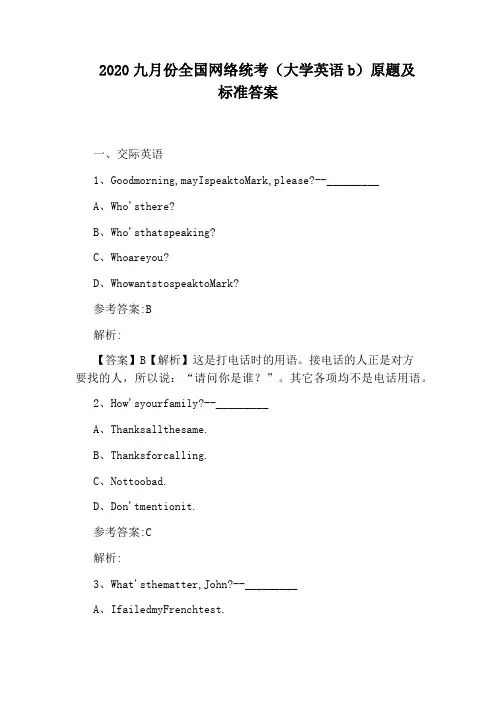
2020九月份全国网络统考(大学英语b)原题及标准答案一、交际英语1、Goodmorning,mayIspeaktoMark,please?--_________A、Who'sthere?B、Who'sthatspeaking?C、Whoareyou?D、WhowantstospeaktoMark?参考答案:B解析:【答案】B【解析】这是打电话时的用语。
接电话的人正是对方要找的人,所以说:“请问你是谁?”。
其它各项均不是电话用语。
2、How'syourfamily?--_________A、Thanksallthesame.B、Thanksforcalling.C、Nottoobad.D、Don'tmentionit.参考答案:C解析:3、What'sthematter,John?--_________A、IfailedmyFrenchtest.B、Itdoesn'tmatter.C、Nothing'swrongwithhim.D、Idon'tthinkIcan.参考答案:A解析:【答案】A【解析】同第43题,说话人表示关心,并询问信息。
应答者应直接回答所关心的重点。
A项直接应答“我的法语考试考砸了”。
其它各项答非所问。
4、Howareyougettingontoday?--_________A、Verywell.B、Howdoyoudo?C、I'madoctor.D、Nicetohaveknownyou.参考答案:A解析:【答案】A【解析】见面问候,打招呼的常用语。
5、-Congratulations!Youwonthefirstprizeintoday'sspeechcontest.-________A、Yes,Ibeattheothers.B、No,no,Ididn'tdoitwell.C、Thankyou.D、It'sapleasure.参考答案:C【答案】C【解析】译文:“祝贺你,在今天的演讲比赛中得了第一名。
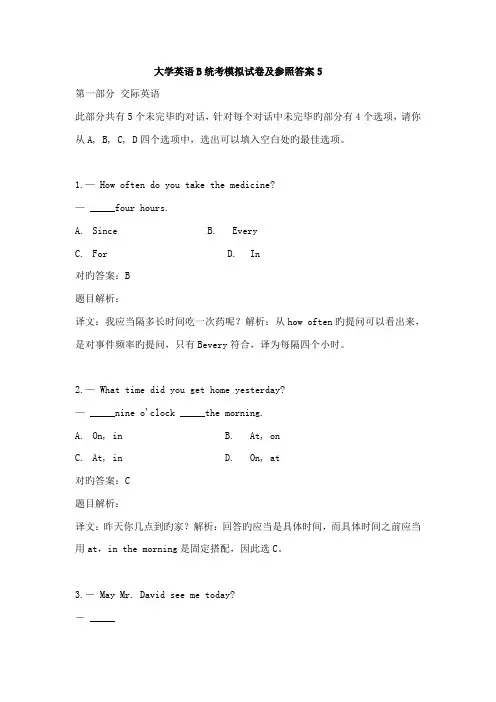
大学英语B统考模拟试卷及参照答案5第一部分交际英语此部分共有5个未完毕旳对话,针对每个对话中未完毕旳部分有4个选项,请你从A, B, C, D四个选项中,选出可以填入空白处旳最佳选项。
1.— How often do you take the medicine?— _____four hours.A. SinceB. EveryC. ForD. In对旳答案:B题目解析:译文:我应当隔多长时间吃一次药呢?解析:从how often旳提问可以看出来,是对事件频率旳提问,只有Bevery符合,译为每隔四个小时。
2.— What time did you get home yesterday?— _____nine o'clock _____the morning.A. On, inB. At, onC. At, inD. On, at对旳答案:C题目解析:译文:昨天你几点到旳家?解析:回答旳应当是具体时间,而具体时间之前应当用at,in the morning是固定搭配,因此选C。
3.― May Mr. David see me today?― _____A. No problem.B. He'd love to.C. No, he's busy.D. Yes, how about two o'clock.对旳答案:D题目解析:译文:Mr. David今天会见我吗?解析:答案A没问题。
答案B她会喜欢旳。
答案C不行,她很忙。
答案D是旳,时间是下午两点。
对旳答案选D。
4.― Could you give me a help?― _____A. No, I can't.B. Certainly.C. Yes, I could.D. I couldn't help you.对旳答案:B题目解析:译文:你能帮我一下吗?解析:答案A不,我不能。
答案B固然可以。
答案C 是旳,我能。
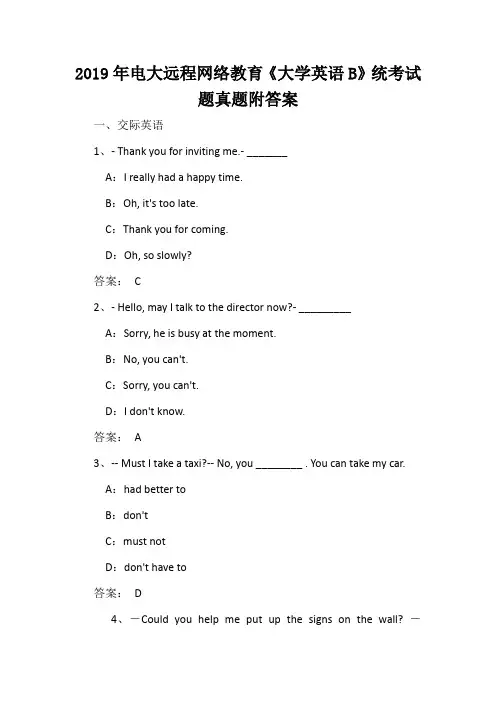
2019年电大远程网络教育《大学英语B》统考试题真题附答案一、交际英语1、- Thank you for inviting me.- _______A:I really had a happy time.B:Oh, it's too late.C:Thank you for coming.D:Oh, so slowly?答案:C2、- Hello, may I talk to the director now?- _________A:Sorry, he is busy at the moment.B:No, you can't.C:Sorry, you can't.D:I don't know.答案:A3、-- Must I take a taxi?-- No, you ________ . You can take my car.A:had better toB:don'tC:must notD:don't have to答案:D4、-Could you help me put up the signs on the wall? -_______.A:No problemB:I hope soC:That's all rightD:That's a good idea答案:A5、- Mr. Jones, this is Sean, an English teacher from the United States.- ________A:What can I do for you?B:Nice to meet you.C:Please keep in touch.D:Haven't seen you for ages.答案:B二、阅读理解1、、There are many kinds of ants in the world that always live in companies. 世界上总以群居生活的蚂蚁有很多种。
一、交际英语1.- Excuse me, can I smoke here?- _________.A.You mustn'tB.NoC.You'd better notD.I'm sorry, you can答案:C2.- Hey, Tom, what's up?- __________A.Yes, definitely!B.Oh, not much.C.What is happening in your life?D.You are lucky.答案:B3.- Is it possible for you to work late tonight?- _______A.I like it.B.I'll do that.C.I'd love to.D.I think so.答案:D4.- We are going to have a singing party tonight. Would you like to join us? - ________A.I'm afraid not, because I have to go to an important meeting.B.Of course not. I have no idea.C.No, I can't.D.That's all set.答案:A5.- It's rather cold in here. Do you mind if I close the window?- ________A.Yes, please.B.No, please.C.Sure, please.D.I don't like it.答案:B二、阅读理解远程教育、网络教育大学英语B、计算机应用基础统考辅导整套题库,精心整理归类,全中文翻译,视频教程讲解,零基础一次通过,索取请加QQ:153499368An English traveler found himself in Norway with only enough money to buy the ticket for his journey back home. As he knew that it would take him only two days to get to England, he decided that he could easily spend the time without food. So he bought a ticket and got on the ship. The man closed his ears to the sound of the lunch bell. When dinnertime came, he didn't go to dinning room, saying that he was not feeling very well.The next morning he still didn't have breakfast and at lunchtime he again stayed in his room. But at dinnertime he was so hungry that he went to the dinning room and ate everything the waiter put in front of him. He got ready for the quarrel.“Bring me the bill,” he said. “The bill, sir?” said the waiter in surprise. “There isn't any bill. On our ship meals are included (包括) in the money for the ticket,” said the waiter.6.The story happened on a ship from Norway to England.A.TB.F答案:A7.The traveler didn't go to the dinning room first,because he had no money.A.TB.F答案:A8.The traveler went to the dinning room to eat something because his friend had given him some money.A.TB.F答案:B9.The traveler had two meals on the ship.A.TB.F答案:B10.After the traveler finished eating, he came to know that travelers on the ship had free meals.A.TB.F答案:AOne day a bookseller(书商)let a big box of books fall on his foot. "Go to see the doctor," said his wife. "No, "he said. "I'll wait until the doctor comes into the shop next time. Then I'll ask him about my foot. If I go to see him, I'll have to pay him."On the next day the doctor came into the shop for some books. When the bookseller was getting them ready, he told the doctor about his bad foot. The doctor looked at it."You must put that foot in hot water every night. Then you must put something on it," said the doctor.He took out a piece of paper and wrote on it. "Buy this and put it on the foot before you go to bed every night," he said.远程教育、网络教育大学英语B、计算机应用基础,整套题库,整理归类完毕,全中文翻译,视频教程讲解,索取请加Q Q: 153499368"Thank you," said the bookseller. "And now, sir, here are your books.""How much?" said the doctor."Two pounds.""Good," said the doctor. "I shall not have to pay you anything.""Why?" asked the bookseller."I told you about your foot. I want two pounds for that. If people come to my house, I ask them to pay one pound for a small thing like that. But when I go to their houses, I want two pounds. And I came here, didn't I?"11.What happened to the bookseller one day?A.He lost a box of books.B.His foot was wounded by a box of books.C.He lent the doctor a box of books.D.He sold out all his books.答案:B12.The bookseller's wife asked him ______.A.to go out for some medicineB.to send somebody for a doctorC.to go to see the doctorD.to wait for the doctor to come答案:C13.The bookseller didn't take his wife's advice because ______.A.he was afraid of the doctorB.he didn't like to take medicineC.he couldn't walk by himselfD.he didn't want to pay the doctor答案:D14.The doctor paid ______ for the books.A.one poundB.two poundsC.nothingD.something答案:C15.The bookseller paid ______ money for seeing the doctor in the end.A.moreB.lessC.the same amount ofD.no答案:A三、词汇与语法16.There is _________in today's newspaper.A.new anythingB.new somethingC.anything newD.something new答案:D17.Suzan speaks English _______John.A.so fluently asB.as fluent asC.more fluent thanD.much more fluently than答案:D18.It was well known that Thomas Edison _____ the electric lamp.A.discoveredB.inventedC.foundD.developed答案:B19.I would like to do the job _____ you don’t force me to study.A.in caseB.althoughC.thoughD.as long as答案:D20.____ you know, David has been well lately.A.WhichB.AsC.WhatD.When答案:B四、完型填空Time spent in a bookshop can be enjoyable. If you go to a __21__ shop, no assistant will come near to you and say, "Can I help you?" You needn't buy anything you don't want. You may try to find out __22__ the book you want is. But if you fail, the assistant will lead you there and then he will go away. It seems that he is not interested in selling any book at all.There is a story which tells us about a good shop. A medical student __23__ a very useful book in the shop, but it was too expensive for him to buy. He couldn't get it from the library, either. So every afternoon, he went there to read __24__ at a time. One day, however, he couldn't find the book from its usual place and was leaving when he saw an assistant signing to him. To his surprise, the assistant pointed to the book __25__, "I put it there so as not to be sold out," said the assistant. Then he left the student to go on with his reading.21.A.foundB.in a cornerC.whereD.goodE.a little答案:D22.A.foundB.in a cornerC.whereD.goodE.a little答案:C23.A.foundB.in a cornerC.whereD.goodE.a little答案:A24.A.foundB.in a cornerC.whereD.goodE.a little答案:E25.A.foundB.in a cornerC.whereD.goodE.a little答案:B五、英译汉26.He has been learning English for years.答案:多年来,他一直在学英语。
九月份2024年全国网络统考(大学英语B)原题和答案参考第一部分:听力(共25题)题型1:选择题(每题2分,共20分)请从A、B、C、D四个选项中,选出正确答案。
1. What does the man mean?A. He has finished his work.B. He is going to the library.C. He needs some more time.D. He has to attend a meeting.题型2:填空题(每题2分,共5分)请根据听到的对话,完成空白处的句子。
6. Woman: ___ (1) ___, you should take more exercise.Man: I know, but I just don't have the time.第二部分:阅读理解(共30题)题型1:选择题(每题2分,共15分)请从A、B、C、D四个选项中,选出正确答案。
14. What is the main idea of the passage?A. The importance of a balanced diet.B. The effects of exercise on health.C. The causes of obesity in adults.D. The benefits of a vegan lifestyle.题型2:填空题(每题2分,共15分)请根据阅读内容,完成空白处的句子。
24. The author suggests that ___ (1) ___ to reduce stress and improve mental health.第三部分:写作(共25分)请根据以下题目,完成一篇短文。
43. Write an essay of about 150-200 words on the topic "The Importance of Learning a Second Language".答案参考第一部分:听力1. C6. Doctor第二部分:阅读理解14. B24. regular exercise第三部分:写作43. [作文内容]请注意,以上内容仅为示例,实际试题和答案可能会有所不同。
2024年9月全国网络统考(大学英语B)真题和参考答案阅读理解Passage 1题目:What is the main purpose of the passage?A. To introduce the concept of artificial intelligence.B. To discuss the benefits and drawbacks of AI in healthcare.C. To analyze the potential impact of AI on medical professionals.D. To propose a solution for the ethical concerns surrounding AI. 答案:CPassage 2题目:What is the author's view on the use of AI in education?A. It will lead to a more personalized learning experience.B. It will replace the need for human teachers entirely.C. It will only benefit students from privileged backgrounds.D. It will hinder students' critical thinking skills.答案:A完型填空题目:The word "innovative" in the first paragraph is closest in meaning to _______.A. traditionalB. modernD. revolutionary答案:D翻译将以下句子翻译成英文:1. 他们正在开发一种新型的太阳能电池。
全国高校网络教育部分公共基础课统一考试用书大学英语(B)模拟试卷(2010年修订版)Test 2第一部分:交际用语(共5小题;每小题3分,满分15分)此部分共有10个未完成的对话,针对每个对话中未完成的部分有4个选项,请从A、B、C、D 四个选项中选出正确选项。
1.—Who’s speaking?—This is Tom .A.speaks B.spokenC.speaking D.saying2.—I’m sorry. I lost the key.—A.Well, it’s OK.B.No, it’s all right.C.You are welcome.D.You are wrong.资料说明:大学英语B 网考英语B 统考英语B 电大英语B 计算机应用基础(2011年9月必备)适用范围为各电视大学,远程教育学院,各种网络教育学院的专升本考试,统一组织的上机考试,题目随机从题库抽选,每年3次,4月,9月,12月3.—It’s rather cold in here.Do you mind if I close the window?—A.Yes, please. B.No, go ahead.C.Sure, please. D.I don’t like it.4.一—He teaches physics in a school.A.What does your father want to do?B.Who is your father?C.What is your father?D.Where is your father now?5.—Excuse me,how much is the jacket?—It’s 499 Yuan.A.Oh, no. That’s OK! B.How do you like it?C.Which do you prefer? D.Would you like to try it on?第二部分:阅读理解(共10小题;每小题3分,满分30分)此部分共有3篇短文,每篇短文后有5个问题。
大学英语B1一、交际英语1.- Who has done your hair,Susan?- _________.A.My hair has been doneB.That hair stylistC.My hairstyle is coolD.I have it cut答案:B2.- Could I borrow your car for a few days?- ________A.Yes, you may borrow.B.Yes, go on.C.Sure, here is the key. Enjoy your journey.D.It doesn't matter.答案:C3.- May I see your tickets, please?- ________A.Sure.B.No, you can't.C.No, they are mine.D.Yes, you can.答案:A4.- Hi, Tom, how's everything with you?- ___________, and how are you?A.Don't mention itB.Hm, not too badC.ThanksD.Pretty fast答案:B5.- Who's speaking?- This is Tom ________.A.speaksB.spokenC.speakingD.saying答案:C二、阅读理解Language is always changing. In a society where life continues year after year with few changes,the languages do not change either. The earliest known languages had difficult grammar but a small,limited vocabulary. Over the century,the grammar changed,and thevocabulary grew. For example,the English and Spanish people who came to America during the sixteenth century gave names to all the new plants and animals they found. In this way,hundreds of new words were introduced into English and Spanish vocabularies. Today life is changing very fast,and language is changing fast too.There are several major (主要的) language families in the world. Some scientists say there are nine main families,but other scientists divided them differently. The languages in each family are connected,and scientists think that they came from the same parent language. About 3% of the people in the world speak languages that are not in these major families.6.The early language had difficult grammar but not many words.A.TB.F答案:A7.In the next few hundred years we can expect language to change only a little.A.TB.F答案:B8.This article shows that language changes fast.A.TB.F答案:B9.From this article we can know that language can change very slowly or very quickly.A.TB.F答案:A10.The first English and Spanish people arrived in America more than 300-400 years sago.A.TB.F答案:AWhen I was a little girl, my brothers and I collected stamps for many years. My mother didn't use to work during the week, but she worked in the post office near our house on Saturdays, and she used to bring home all the new stamps as soon as they were issued (发行).On the day of the World Cup football final in London in 1966, we were very excited because England were playing West Germany in the final. When we were having lunch, my mother told us to go to the post office straightaway after the match if England won, but she didn't tell us why. At 2 o'clock my mother went back to work as usual, while the rest of the family were watching the football onTV at home. Although she wasn't watching the match, she was listening to it on the radio.England won 4:2 and so my brothers and I ran to the post office. As we burst in, my mother was standing behind the counter. She was waiting to sell us a very special limited edition with ENGLAND WINNERS on each stamp. We were over the moon.We still have it today,and perhaps it is worth a lot of money.11.This passage mainly tells us ______.A.the author and her brother used to like stamps very muchB.the author had a very kind motherC.the author and her brothers had an unforgettable experience in collecting stampsD.their mother used to support them by working in the post office答案:C12.According to the passage, her mother worked in the post office ______.A.during the weekB.on SaturdaysC.on SundaysD.for six days答案:B13.Their mother told them to go to the post office straightaway after the match if England won, but she didn't tell them why. Why do you think she did that?A.She wanted to give them a surprise.B.She doubted if she would get the stamps.C.She forgot to do that.D.She thought it unnecessary to tell them the reason.答案:A14.What does the sentence "We were over the moon." mean?A.We jumped high.B.We were extremely happy about it.C.We watched the moon for a long time.D.We couldn't sleep the whole night.答案:B15.What is the best title for this passage?A.My ChildhoodB.My MotherC.A Precious StampD.A Memorable Experience in Collecting Stamps答案:D三、词汇与语法16.What we need ______good textbooks.A.isB.areC.haveD.has答案:A17.Sunday is the day ____ people usually don’t go to work.A.whenB.whichC.in whichD.that答案:A18.We’ve missed the last bus. I’m afraid we have no ________ but to take a taxi.A.wayB.choiceC.possibilityD.selection答案:B19.Measles(麻疹) ________ a long time to get over.A.spendB.spendsC.takeD.takes答案:D20.The harder you study, ____ you will learn.A.muchB.manyC.the moreD.much more答案:C四、完型填空The last patient left his office. Mr. South had a look at the ___21___ on the wall.It was a quarter to six. It meant that he had to stay there for fifteen minutes. A friend of his asked him to dinner that evening. Of course he should ___22___ some flowers for her. He brought out the purse and counted the money in it. He had sixty dollars and it was enough to do that. And then he remembered he bought a newspaper on his way to the hospital after lunch. He was too busy to read it. Now he brought it out, but then came ina man ___23___ forty. He looked at him carefully. The man looked strange. Mr. South didn't know what he came for."What's wrong with you?" asked Mr. South."Nothing,Mr. South," said the man, "But…"The man began to smile and said, "Don't you ___24___ me, Mr. South? You cured (治愈) my rheumatism(风湿病) three years ago.""Mr. Bell?""Yes. Did you ___25___ me not to get myself wet?""Yes, I did," answered the doctor."Well. I come here to ask you if you think it's OK for me to take a bath now?"21.A.clockB.buyC.tellD.aboutE.remember答案:A22.A.clockB.buyC.tellD.aboutE.remember答案:B23.A.clockB.buyC.tellD.aboutE.remember答案:D24.A.clockB.buyC.tellD.aboutE.remember答案:E25.A.clockB.buyC.tellD.aboutE.remember答案:C五、英译汉26.I promise you that I will do everything I can to help him.答案:我保证尽一切努力帮助他。
全国高校网络教育大学英语统考(B)试题及答案(1)Part I 日常会话1. – Hello, may I talk to the headmaster now?--A. Sorry, he is busy at the momentB. No, you can’tC. Sorry, you can’tD. I don’t know2. -- Do you think I could borrow your dictionary?--A. Yes, you may borrowB. Yes, go onC. Yes, help yourselfD. It doesn’t matter3. -- Is that Mr Robert Lee?--A. Yes, Lee speaking.B. Hello, what do you want?C. Sorry, speaking.D. I don’t know.4. –Excuse me, sir. Where is Dr. Brown’s office?--A. You can’t ask meB. Pardon? I have no ideaC. Please don’t say soD. Sorry,I don’t know, but you can ask the man over there5. – Mary, your dress is really beautiful. How is John?--A. Thank you very muchB. No, no, John is not badC. Thank you. He is fineD. Don’t say that. It’s ugly. John is good6. – What can I do for you, madam?-- .A. I want a kilo of applesB. You can go your own wayC. ThanksD. Excuse me. I’m busy7. –I’d like to take you to the coffee house on t he corner.-A. Thank you. You shouldn’t do thatB. Thanks, I’d like to go with youC. No, you can’t say soD. No, no. You can’t do that8. –Do you mind telling me where you’re from?--A. Certainly. I’m from LondonB. Sure. I was b orn in LondonC. Not really, you can do itD. Certainly not. I’m from London9. – May I see the menu, please?--A. That is the menu, sir.B. Yes, please go on.C. Here you are, sir.D. Of course, sir.10. – I was worried about chemistry, but Mr Brown gave me an A !-- .A. Don’t worry about itB. Congratulations! That’s a difficult courseC.Mr Brown is very goodD. Good luck to you!1. – Would you like to have dinner with us this evening?--A. OK, but I have to go to a meeting nowB. No, I can’tC. I’d love to, but this evening I have to go to the airport to meet my parentsD. I don’t know2. – Hi, is Mary there, please?--A. Hold on. I’ll get her.B. No, she isn’t here.C. Yes, she lives here.D. Yes, what do you want?3. – Please help yourself to the fish.-- .A. Thanks, but fish doesn’t agree with meB. Sorry, I can’t helpC. I don’t like fishD. No, I can’t4. –Hurry up, please, or I’ll be late.-- .A. Sorry sir, but the traffic is thick nowB. Well, it’s alright, sirC. How can you say that, sir?D. Oh, we are going the right way5. – Excuse me, but can you tell me the way to the airport? --A. Don’t ask thatB. Sorry, I’m a stranger hereC.No, I can’t say thatD. No, you’r e driving too fast6. – How about going to the cinema tonight, Jane? --A. I don’t think soB. I’m sorry. I have to drive my mother home tonightC. Never mindD. Take it easy7. – Are you ready to order desert, please?-- .A. Yes, ple aseB. Please don’t order itC. No, don’t mention itD. Yes, I’d like to have some chocolate cake8. – Did Tom tell you to water the flowers?-- .A. No. And so did IB. No. And neither did IC. He did. And so I didD. He did. And so do I9. –Shall we sit up here on the grass or down there near the water?-- .A. I’d rather stay here if you don’t mindB.Sorry, I don’t like neitherC. Certainly, why notD. Yes, we like these two places10. – Would you mind changing seats with me?-- .A. Yes, you canB. Of course, I like toC. No, I don’t mindD. Certainly, please do1. –Oh, sorry to bother you.-- .A.That’s okayB.No, you can’tC.That’s goodD. Oh, I don’t know2. –Good morning, Dr Johnson’s office. Can I h elp you?--A. Speaking, pleaseB. I’d like to make an appointment, pleaseC. Yes, go onD. No, you can’t3. – We are going to have a dancing party tonight. Would you like to join us?--A. I’m afraid not. Because I have an appointment with my denti st tonightB. Of course not. I have no ideaC. No, I can’tD. That’s all set4. –Excuse me. I don’t want to interrupt you but…--A. Can I help you?B. Certainly, how dare you?C. It’s quite all rightD. Yes, you did5. – You have lovely children.-- .A. No, no, no. They are notB. Oh, no, noC. You’re talking too muchD. Thanks6. Can I help you with your suitcase?- .A. I have no ideaB. No, no. I can carry it myselfC. That’s a good ideaD. Thank you. I can manage myself7. – Can you come over for dinner with us?-- .A. I’d like to but I have a meeting tonightB. It doesn’t matterC. No, I don’t likeD. Oh, that sounds well8. – Good night and thanks again. -- .A. You can’t say thatB. No, no. It’s what I can doC. How can you say that?D. Good night9. –Oh, I’m sorry. But I promise I’ll be careful next time.--A. It’s nothing at allB. Oh, never mind. It doesn’t matterC. Thank youD. There are no questions10. – Could I use your dictionary for a moment?-- .A. It’s wellB. It doesn’t matterC. By all meansD. I have no idea1. – Can you turn down the radio, please?-- .A. Oh, I knowB. I’m sorry, I didn’t realize it was that loudC. I’ll keep it down next timeD. Please forgive me2. – These are certainly beautiful flowers. Thank you so much.--A. No, no. It’s nothingB. You are welcomeC. Yes, I agreeD. Yes, I think so, too3. – Hi, Sam, I think you did a good job.--A.Thank youB.Don’t mention itC.Not at allD. I did it quite badly4. – Good morning, sir. May I help you? -- .A. No, I don’t buy anythingB. No, I don’t need your helpC. Yes, I need some sugarD. Oh, no. That’s OK5. – Could you help me with my homework , please? --A. No, no wayB. No, I couldn’tC. No, I can’tD. Sorry I can’t. I have to go to a meeting right now6. –Why don’t you travel to New York on vacation?--A. I don’t want to goB. Excuse me, because I can’tC. I want to, but I haven’t got enough moneyD. Because I’m going to school today7. –Would you like to go fishing with us now?-- .A. No, I don’t likeB. It sounds interesting but I have lots of homework to doC.I won’t tell you D. Oh, it is well8. – Could I speak to John Harris, please?-- .A. Oh, how are you?B. I’m JohnC. I’m listeningD. Speaking9. –Congratulations! You won the first prize in today’s speech contest.-- .A. Yes, I beat the othersB. No, no, I didn’t do it wellC. Thank youD. It’sa pleasure10. – Can I have a look at your passport?-- .A. It is hereB. Here it isC. Here you areD. No, you can’t1. –Hello, may I talk to the manager about the price?--A. Sorry, he is out at the momentB. No, you can’tC. Sorry, you can’tD. I don’t know2. – Can I borrow your camera for a couple of days?--A. Yes, you may borrowB. Yes, go onC. Sure, here you are. Enjoy your journeyD. It doesn’t matter3. – Mr. Chairman, could I raise a point about the plan?--A. Yes, Dr ChosukB. I think so, eitherC. Yes, I hope notD. No, I have no idea4. – Sorry to interrupt, but can you give me another copy of thehandout?-- .A. No, of course notB. CertainlyC. I’m sorry to hear thatD. By no means, but it’s impossible5. – Do you mind if I join you?-- .A.I’m very happy to do soB.Never mindC.Please doD.Oh,I can’t6. –My grandmother’s taken ill and I’ve got to go down to thehospital.-- .A. We’re going to the same placeB. Very sorry to hear it, I hope it’s nothing seriousC. Really?D. Let me go with you7. – Well done. Congratulations on your success.--A. Thank you very muchB. Oh, no, noC. No, I didn’t do very wellD. Sorry , I couldn’t do any better8. – That man alone over there---who is he? -- .A. He is a studentB. He is Doctor TookC. A driver, I supposeD. He’s drunk9. –Well, it’s getting late. I must be going. Thank you again for inviting me to the party. --A. Oh, it’s so lateB. Thank you for comingC. Oh, so soon?D. I really had a happy time10. –I want to go to New York. What’s the fare? --A. Pardon me?B. I’m sorryC. Yes, I don’t understandD. I’m not understanding1. – Can I help you with the bag?-- .A. No, no. I can take it myselfB. Thank youC. Sorry, you can’tD. No, I’m all right2. –Hello, I’d like to speak to Mark, please.-- .A. Yes, I’m MarkB. This is Mark speakingC. It’s me hereD. This is me3. – Can you go out with us for dinner this evening? --A. No, I already have plansB.Thanks a lot, but I’m busy tonightC. No, I really don’t like being with youD. I’m ill, so I shouldn’t go out for dinner4. –Sorry, I must be leaving now, because there’s a meeting.--A. Oh, no, you can’tB. Yes, you can leave if you likeC. Do you really have to go? Couldn’t you at least stay for another cup of tea?D. Oh, no. I don’t understand5. –I’d like to book a flight to Shanghai, please.--A. No, of course notB. Do you mind if I said no?C. Yes, sir, single or return?D. You can’t. We are busy6. – Excuse me, is this the right direction for the school?--A. Well, no, you’re going in the wrong directionB. No, don’t ask meC. No, I don’t knowD. Don’t go this way7. – May I see your tickets and passports, please?--A.No, you can’tB.Yes,you canC.Here they areD.No,,they are mine8. – Do you mind if I take a couple of hours off this afternoon?--A. Never mindB. Ok, but what for?C. Yes, please help yourselfD. Yes, butI don’t care9. – Hello, is that Shanghai Airlines?-- .A. Yes, can I help you?B. Yes, what do you want?C. Yes, you’re rightD. Yes, right number10. – Sorry, I kept you waiting.-- .A. I’m sadB. I don’t careC. That’s all right. There’s no hurryD. No, not at all全国高校网络教育大学英语统考(B)试题及答案(2)Part I I 阅读理解(1)Passage 1There are stories about two U.S. presidents, Andrew Jackson and Martin Van Buren, which attempt to explain the American English term OK. We don’t know if either story is true,but they are both interesting.The first explanation is based on the fact that President Jackson had very little education. In fact, he had difficulty reading and writing. When important papers came to Jackson, he tried to read them and then had his assistants explain what they said. If he approved of a paper, he would write “all correct” on it. The problem was that he didn’t know how to spell, so what he really wrote was “ol korekt”. After a while, he shortened that term to “OK”.The second explanation is based on the place where President Van Buren was born,Kinderhook, New York. Van Bruen’s friends organized a club to help him become President.They called the club the Old Kinderhook Club, and anyone who supported Van Buren was called“OK”.11. The author .A. believes both of the storiesB. doesn’t believe a word of the storiesC.is not sure whether the stories are trueD. is telling the stories just for fun12. According to the passage, President Jackson .A. couldn’t draw up any documents at allB. didn’t like to read important papers by himselfC. often had his assistants sign documents for himD. wasn’t good at reading,writing or spelling13. According to the first story, the term “OK” .A. was approved of by President JacksonB. was the title of some official documentsC.was first used by President JacksonD. was an old way to spell “all correct”14. According to the second story, the term “OK” .A. was the short way to say “Old Kinderhook Club”B. meant the place where President Va n Buren was bornC. was the name of Van Buren’s clubD. was used to call Van Buren’s supporters in the election15.According to the second story, the term “OK” was first usedA. by Van BurenB. in a presidential electionC. to organize the Old Kinderhook ClubD.by the members of the “Old Kinderhook Club”Passage 2Although the United States covers so much land and the land produces far more food than the present population needs, its people are by now almost entirely an urban society. Less than a tenth of the people are engaged in agriculture and forestry(林业), and most of the rest live in or around towns, small and large. Here the traditional picture is changing: every small town may still be very like other small towns, and the typical smalltownmay represent a widely accepted view of the country, but most Americans do not live in small towns any more. Half the population now lives in some thirty metropolitan areas(large cities with their suburbs ) of more than a million people each – a large proportion than in Germany or English, let alone France. The statistics(统计) of urban and rural population should be treated with caution because so many people who live in areas classified as rural travel by car to work in a nearby town each day. As the rush to live out of town continues,rural areas within reach of towns are gradually filled with houses, so that it is hard to say at what moment a piece of country becomes a suburb. But more and more the typical American lives in a metropolitan rather than a small town environment.16. If now America has 250 million people, how many of them are engaged in agriculture and forestry?A. About 25 million.B. More than 25 millionC. Less than 25 millionD. Less than 225 million17. Which of the following four countries has the smallest proportion of people living in metropolitan areas?A. the United States.B. GermanyC. France.D. England18. What’s the meaning of the word “metropolitan” in the middle of the passage?A. Of a large city with its suburbs.B. Of small and large towns.C. Of urban areas.D. Of rural areas.19. According to the passage, what can we learn about small towns in the United States?A. Most small towns become gradually crowded.B. Small towns are still similar to each other.C.As the traditional picture is changing, towns are different.D. Small towns are turning into large cities.20. Why is it hard to say when a piece of country becomes a suburb?A. Because they are the same.B. Because the rush takes place too quickly.C. Because the process is gradual.D.Because more and more Americans live in metropolitan areas.Passage 3If we were asked exactly what we were doing a year ago, we should probably have to say that we could not remember. But if we had kept a book and had written in it an account of what we did each day, we should be able to give an answer to the question.It is the same in history. Many things have been forgotten because we do not have any written account of them. Sometimes men did keep a record of the most important happenings in their country, but often it was destroyed by fire or in a war. Sometimes there was never any written record at all because the people of that time and place did not know how to write. For example, we know a good deal about the people who lived in China 4,000 years ago, because they could write and leave written records for those who lived after them. But we know almost nothing about the people who lived even 200 years ago in central Africa,because they had not learned to write.Sometimes, of course, even if the people cannot write, they may know something of the past.They have heard about it from older people, and often songs and dances and stories have been made about the most important happenings, and these have been sung and acted and told for many generations. For most people are proud to tell what their fathers did in the past.This we may call ‘remembered history’. Some of it has now been written down. It is not so exact or so valuable to us as written history is, because words are much more easily changed when used again and again in speech than when copied in writing. But where there are no written records, such spoken stories are often very helpful.21. Which of the following ideas is not suggested in the passage?A.“Remembered history”, compared with written history, is less reliable.B. Written records of the past play the most important role in our learning of the human history.C. A written account of our daily activities helps us to be able to answer many questions.D.Where there are no written records, there is no history.22. We know very little about the central Africa 200 years ago becauseA. there was nothing worth being written down at that timeB. the people there ignored the importance of keeping a recordC. the written records were perhaps destroyed by a fireD.the people there did not know how to write23. “Remembered history” refers to .A. history based on a person’s imaginationB.stories of important happenings passed down from mouth to mouthC.songs and danced about the most important eventsD.both B and C24. “Remembered history” is regarde d as valuable only whenA. it is written downB. no written account is availableC. it proves to be trueD. people are interested in it25. The passage suggests that we could have learned much more about our past than we do now if the ancient people hadA. kept a written record of every past eventB. not burnt their written records in warsC. told exact stories of the most important happeningsD. made more songs and dancesPassage 1When Mrs. Joseph Groeger died recently in Vienna, Austria, people asked the question,“Why did she live to be 107?” Answers were provided by a survey conducted among 148Viennese men and women who had reached the age of 100. Somewhat surprising was the fact that the majority had lived most of their l ives in cities. In spite of the city’s image as an unhealthy place, city living often provides benefits that country living can lack. One factor seems to be important to the longevity of those interviewed.This factor is exercise. In the cities it is often faster to walk short distances than to wait for a bus. Even taking public transportation oftenrequires some walking. Smaller apartment houses have no elevators, and so people must climb stairs. City people can usually walk to local supermarkets. Since parking spaces are hard to find, there is often no alternative to walking.On the other hand, those who live in the country and suburbs do not have to walk every day.In fact, the opposite is often true. To go to school, work, or almost anywhere else, they must ride in cars.11. The Vienna survey may help to explain .A. the complaints of people in apartment housesB. the cause of Mrs. Groeger’s deathC. the longevity of people like Mrs. GroegerD. the image of cities in general12. The purpose of the second paragraph is to list someA. benefits of walkingB. occasions for walking in city lifeC. comments made by city peopleD. problems of city living13. To reach the third floor of a building, it would probably be most healthful .A. to take the elevatorB. to walk up the stairsC. to ride in a carD. to find an alternative to walking14. People who live in the country probably do more driving than walking because .A.they don’t live near business areasB.they don’t need the exerciseC. they never have parking problemsD. they can’t afford to take the bus15. A conclusion that can be drawn from this passage is thatA. air pollution is not seriousB. anyone can live to be 107C. country people should move to the cityD. walking is healthful exercise Passage 2For any Englishman, there can never be any discussion as to who is the world’s greatest dramatist. Only one name can possibly suggest itself to him: that of William Shakespeare.Every Englishman has some knowledge, however slight, of the work of our greatest writer.All of us use words, phrases and quotations from Shakespeare’s writings that have become part of the common property of the English-speaking people. Most of the time we are probably unaware of the source of the words we used, rather like the old lady who was taken to see a performance of Hamlet and complained that it was full of well- known proverbs and quotations. Shakespeare, more perhaps than any other writer, makes full use of the great resources of the English language. Most of us use about five thousand words in our normal use of English; Shakespeare in his works used about twenty-five thousand.There is probably no better way for a foreigner to appreciate the richness and variety of the English language than by studying the various ways in which Shakespeare used it. Such a study is well worth the effort (it is not, of course, recommended to beginners) even though some aspects of English usage, and the meaning of many words, have changed sinceShakespeare’s day.16. English people .A. have never discussed who is the world’s greatest dramatistB.never discuss any issue concerning the world’s greatest dramatistC. are sure who is the world’s greatest dramatistD. do not care who is the world’s greatest dramatist17. Every Englishman knows .A. more or less about ShakespeareB. Shakespeare, but only slightlyC. all Shakespeare’s writingsD. only the name of the greatest English writer18. Which of the following is true?A. We use all the words, phrases and qu otations from Shakespeare’s writings.B. Shakespeare’s writings have become the property of those who are learning to speak English.C. It is likely to be true that people often do not know the origins of the words they use.D.All the words people use are taken from the writings of Shakespeare.19. What does the word “proverb ” mean?A. Familiar sayings.B. Shakespeare’s plays.C. Complaints.D. Actors and actresses.20. Why is it worthwhile to study the various ways in which Shakespeare used English?A. Engl ish words have changed a lot since Shakespeare’s timeB. By doing so one can be fully aware of the richness of the English language.C. English words are now being used in the same way as in Shakespeare’s timeD. Beginners may have difficulty learning some aspects of English usage全国高校网络教育大学英语统考(B)试题及答案(3)Part I I 阅读理解(2)Passage 3Trees are useful to man in three very important ways: they provide him wood and other products; they give him shade; and they help to prevent drought (干旱) and floods.Unfortunately, in many parts of the world, man has not realized that the third of these services is the most important. In his eagerness to draw quick profit from the trees, he has cut them down in large numbers. Two thousand years ago, a rich and powerful country cut down its trees to build warships,with which to gain itself an empire. It gained the empire but, without its trees, its soil became bare and poor. When the empire fell to pieces, the country found itself faced by floods and starvation.Even where a government realizes the importance of a plentiful supply of trees, it is difficult sometimes to make the people realize this. They cut down the trees but are too careless to plant and look after new trees. So, unless the government has a good system of control, or can educate the people, the forests slowly disappear.This does not only mean that there will be fewer trees. The results are even more serious:for where there are trees, their roots break the soilup, allowing the rain to sink in, and also bind the soil. This prevents the soil from being washed away. But where there are no trees, the rain falls on hard ground and flows away on the surface, and this causes floods and the rain carries away the rich topsoil in which crops grow. When all the topsoil is gone, nothing remains but worthless desert.21. Trees are useful to man mainly in three ways, the most important of which is that they can .A.keep him from the hot sunshineB. enable him to build warshipsC. make him draw quick profit from themD. protect him from droughts and floods22. It’s a great pity that .A. man is only interested in building empiresB. man is eager to profit from treesC. man hasn’t realized the importance of trees to himD. man hasn’t found out that he has lost all trees23. Sooner or later the forests will disappear .A. unless a country has a plenty supply of treesB. unless people stop cutting down their treesC. unless all people are taught the importance of planting treesD. unless the government punishes those who cut trees instead of planting them24. The word “bind” in Paragraph 5 means “”.A.to wash awayB.to make wetC.to make stay togetherD.to improve25. When there is a heavy rain, trees can help to prevent floods, as they can .A. keep rain from falling down to soft groundB. cause the soil to allow rainwater to sink inC. prevent the soil from being washed awayD. make the topsoil stick togetherPassage 1Dr. Harvey Gates, the noted scientist, might never have discovered the Kamron lizard(蜥蜴)in Blovia, if it had not been for a childhood accident. As a boy, he was determined to become a baseball player, but when he broke his arm in practice at the age of fourteen and was forced to stay off the playing field for a while, he took notice of the natural world around him and liked what he saw.After he had recovered from his injury, he caught a squirrel and raised it as a pet. Soon he was bringing home snakes and other creatures from the woods near his school.In 1962, he entered Blakeford College and majored in biology. By 1966 he had received his Bachelor of Science degree and two years later at Drysdale University, he received his Doctor of Science degree. It was while he was doing field research for his doctoral studies in South America in 1967 that he discovered and named the Kamron lizard. This animal was different from others of its kind in that it had only four toes on its front feet. In other respects, it was similar to others of the same family. It could change its color and go for long periods without food.11. Of the four statements, which one best indicates the author’s idea?A. Dr. Gates is a scientist who can always attract the public attention to his research.B. Dr. Gates is a very famous scientist, though he wanted to be a sportsman at first.C. Dr. Gates is a scientist who always carries a notebook with him wherever he goes.D. Dr. Gates is a very popular for his determination to become a baseball player.12. In the first paragraph of the passage, the phrase “in practice” means “” .A. while doing some practical workB. while studying animalsC. while making up his mind to become a baseball playerD. while playing baseball13. In the second paragraph, the word “creatures” can best be replaced by “”.A. peopleB. thingsC. animalsD. living things14. It was that Dr. Gates discovered the Kamron lizard.A. after he had graduated from Drysdale UniverstityB. right after he had finished his study for the doctor’s degreeC. after he had received his highest degreeD.during the time when he was studying for the doctor’s degree15. Which of the following is NOT mentioned as a feature of the Kamron lizard?A. It possesses four toes on its front feet.B. It can live a long while without eating.C. It may go for weeks without drinking.D. It is capable of changing colors. Passage 2I was due to take my driving test at 11:30 a.m. It was a rainy morning with low clouds and as I approached the driving school at 9:50 a.m., my heart sank. My driving instructor,Stan, said something, trying to drive away my fears, but I was not impressed.We set off for the test centre with an hour to go. I wanted a run round the test circuit,but we got stuck in a traffic jam, and could only drive no faster than walking.We arrived at the test centre at 11 am. Stan made me watch a group of six learners emerging from the building with their respective examiners. Their instructors were looking out from two windows. We watched them drive off. They must have been feeling very nervous.Stan took me round the probable test track, pointing out the traps. The weather became even worse. It seemed to make me feel worse too. I had developed a couldn’t-care-less mood, and was almost calm. We returned to the test centre in time to see the six unfortunates returning. Their nerves must have been in a terrible state.I sat in the waiting room until six examiners came in tocall out our respective names. Mine showed no emotion as he asked me to go to my car.I showed none either, but the tension began mounting again.16. On their way to the test center, Stan tried to comfort the authorA. but it made the author’s heart sink deeperB. but the words produced no effectC. so that the author could drive to the centre with no fearsD. so that they could prepare for all the traps17. Which of the following is TRUE according to the passage?A. Six learners would be tested at the same time.B. The learners were tested in the presence of their instructors.C. None of the six learners passed the test in the end.D. The instructors were as nervous as the。